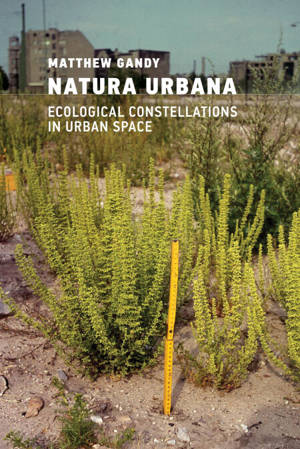
Je cadeautjes zeker op tijd in huis hebben voor de feestdagen? Kom langs in onze winkels en vind het perfecte geschenk!
- Afhalen na 1 uur in een winkel met voorraad
- Gratis thuislevering in België vanaf € 30
- Ruim aanbod met 7 miljoen producten
Je cadeautjes zeker op tijd in huis hebben voor de feestdagen? Kom langs in onze winkels en vind het perfecte geschenk!
- Afhalen na 1 uur in een winkel met voorraad
- Gratis thuislevering in België vanaf € 30
- Ruim aanbod met 7 miljoen producten
Zoeken
€ 34,49
+ 34 punten
Uitvoering
Omschrijving
A study of urban nature that draws together different strands of urban ecology as well as insights derived from feminist, posthuman, and postcolonial thought.
Postindustrial transitions and changing cultures of nature have produced an unprecedented degree of fascination with urban biodiversity. The “other nature” that flourishes in marginal urban spaces, at one remove from the controlled contours of metropolitan nature, is not the poor relation of rural flora and fauna. Indeed, these islands of biodiversity underline the porosity of the distinction between urban and rural.
In Natura Urbana, Matthew Gandy explores urban nature as a multilayered material and symbolic entity, through the lens of urban ecology and the parallel study of diverse cultures of nature at a global scale.
Gandy examines the articulation of alternative, and in some cases, counterhegemonic, sources of knowledge about urban nature produced by artists, writers, scientists, as well as curious citizens, including voices seldom heard in environmental discourse. The book is driven by Gandy’s fascination with spontaneous forms of urban nature ranging from postindustrial wastelands brimming with life to the return of such predators as wolves and leopards on the urban fringe. Gandy develops a critical synthesis between different strands of urban ecology and considers whether "urban political ecology," broadly defined, might be imaginatively extended to take fuller account of both the historiography of the ecological sciences,and recent insights derived from feminist, posthuman, and postcolonial thought.
Postindustrial transitions and changing cultures of nature have produced an unprecedented degree of fascination with urban biodiversity. The “other nature” that flourishes in marginal urban spaces, at one remove from the controlled contours of metropolitan nature, is not the poor relation of rural flora and fauna. Indeed, these islands of biodiversity underline the porosity of the distinction between urban and rural.
In Natura Urbana, Matthew Gandy explores urban nature as a multilayered material and symbolic entity, through the lens of urban ecology and the parallel study of diverse cultures of nature at a global scale.
Gandy examines the articulation of alternative, and in some cases, counterhegemonic, sources of knowledge about urban nature produced by artists, writers, scientists, as well as curious citizens, including voices seldom heard in environmental discourse. The book is driven by Gandy’s fascination with spontaneous forms of urban nature ranging from postindustrial wastelands brimming with life to the return of such predators as wolves and leopards on the urban fringe. Gandy develops a critical synthesis between different strands of urban ecology and considers whether "urban political ecology," broadly defined, might be imaginatively extended to take fuller account of both the historiography of the ecological sciences,and recent insights derived from feminist, posthuman, and postcolonial thought.
Specificaties
Betrokkenen
- Auteur(s):
- Uitgeverij:
Inhoud
- Aantal bladzijden:
- 432
- Taal:
- Engels
Eigenschappen
- Productcode (EAN):
- 9780262367462
- Verschijningsdatum:
- 7/03/2022
- Uitvoering:
- E-book
- Beveiligd met:
- Adobe DRM
- Formaat:
- ePub

Alleen bij Standaard Boekhandel
+ 34 punten op je klantenkaart van Standaard Boekhandel
Beoordelingen
We publiceren alleen reviews die voldoen aan de voorwaarden voor reviews. Bekijk onze voorwaarden voor reviews.









